We spoke to CIPFA apprentice Armanda Naziri and her line manager, Nick Sharp from the London Borough of Newham about the Counter Fraud Investigator Apprenticeship.
Armanda's story
Armanda Naziri began her career as an apprentice fraud investigator for the London Borough of Newham in September 2022, starting the CIPFA Level 4 Counter Fraud Apprenticeship the following month.
Armanda’s interest in tackling fraud stemmed partly from her degree in Criminology from City, University of London – but serving the public was also a major reason for joining the Newham fraud team, as she explains: “I was drawn to the public sector because of my strong commitment to serving the community and making a positive impact on society. Working in the public sector allows me to contribute to the greater good and ensure that public resources are used effectively and ethically.”
Armanda believes her role aligns with that ethos: “My interest in counter fraud specifically stems from a desire to uphold integrity and accountability within organisations,” Armanda says. “I believe that fighting fraud is crucial in maintaining public trust and ensuring that funds are allocated properly to those in need.
As Armanda points out, her two-year counter fraud investigator apprenticeship is part of a training programme that leads to the Accredited Counter Fraud Specialist (ACFS) qualification – the benchmark professional award for counter fraud practitioners in the UK – and delivers the specialist knowledge and skills required for to tackle financial fraud in the public sector.
“Ultimately, a career in counter fraud in the public sector enables me to combine my passion for the public service with my dedication to promoting ethical practices,” she says.
Responsibilities
Armanda’s responsibilities as an apprentice fraud Investigator currently include identifying and investigating potential cases of housing fraud, which can encompass sub-letting, fraudulent applications and possible Right to Buy issues. This involves reviewing reports made to the fraud team, carrying out initial checks and then initiating action where necessary. Her remit has expanded during her time in the team, in line with her experience and CIPFA training, working closely with colleagues from other departments and external organisations to help detect and prevent fraudulent activities in a co-ordinated way.
Overseeing Armanda’s apprenticeship is line manager Nick Sharp, head of counter fraud for the London Borough of Newham. “We’re an 11-strong team that looks after all of the internal and external fraud against the council,” he says. “Armanda was our first counter fraud apprentice. I’d been part of the initial Trailblazer group developing the counter fraud apprenticeship, and I was keen to put it into practice when the opportunity arose. In 2022, we were looking at recruiting the next batch of investigators to fill roles in the team – and with this apprenticeship, we’ve been able to tap into really good people who are dedicated to pursuing a career in counter fraud, individuals who are fresh, enthusiastic and will bring new ideas into the team.”
Nick says that the counter fraud apprenticeship route can help with mid- to long-term development planning and shaping of an effective team. “It’s about future-proofing the team. The mix is important; you clearly still need experience, as the apprentices are learning from seasoned investigators, but it’s a really good way of getting people who are interested in fraud who, when fully trained, will want to continue their career with you. Making that decision has certainly been good for us.”
Developing skills
For Armanda, the skills and knowledge she has acquired through the CIPFA Counter Fraud Investigator Apprenticeship have been “incredibly valuable”, she says: “It’s a great programme and it has definitely provided me with a solid foundation for a career in the counter fraud profession. I’m gaining a variety of valuable skills – I’ve covered investigative techniques, legal frameworks and ethical considerations, and have gained practical skills in areas such as evidence gathering, conducting investigations, interviewing, analysing data and understanding regulatory compliance.
“The apprenticeship has enabled me to directly apply my learning to my current role as a fraud investigator, improving my effectiveness in identifying and preventing housing fraud. In addition, the structured training and my role in Newham Council has boosted my confidence and ability in handling fraud cases.”
Armanda continues: “The apprenticeship is setting me up for a successful future career by equipping me with a recognised qualification and a comprehensive skill set. Overall, the CIPFA apprenticeship is a crucial step in advancing my career in counter fraud, ensuring that I am well-prepared for future challenges and opportunities.”
Managing well
From a manager’s perspective, Nick has also been very pleased with his first experience of the CIPFA counter fraud apprenticeship. “It’s been really positive. Managing Armanda has been absolutely great, she’s been a pleasure to work with,” he says. “She's been really beneficial to our team, fitted into our set up from day one and approached it from the start with a can-do attitude and great work ethos.”
The CIPFA apprenticeship’s blended learning approach provides students with both valuable on-the-job experience and expert tuition delivered by CIPFA’s experienced and knowledgeable CFPAB-accredited trainers, as well as one-to-one support and guidance for apprentices when needed.
“The part I have probably enjoyed the most is the lessons, usually monthly, which are always interesting and engaging,” Armanda says. “They are very informative and give us an opportunity to ask questions and complete tasks. I also get to catch up with the other apprentices from different organisations who are also on the programme – it’s always fascinating to get an understanding of what they do as part of their roles and how they approach things.
“The collaborative projects and discussions with fellow apprentices are highly valuable; they provide diverse perspectives and insights, fostering a collaborative learning environment that I feel contributes significantly to my professional growth.”
Nick acknowledges the rewards this approach has delivered in Armanda's day-to-day development. “Armanda has come on loads since she first joined us, and she has been gradually taking on more responsibility. We've been trying to do that in line with our own progression and growth path, but also to align with the apprenticeship course as well, to ensure that she's experiencing the right elements at the right times. Juggling her day job with learning is obviously a challenge, but Armanda has risen to it. In the last year she's been shortlisted for three apprentice awards, an internal award and two external awards. That has been really positive for us, and for the team.”
Meanwhile, Armanda’s goal in the short-term is to continue developing as a fraud investigator. “Over the next few years, I aim to take on more complex cases and have more responsibilities within my team, contributing to the development of more effective fraud prevention strategies,” she says. “I think the skills and knowledge I am gaining from my current role and the CIPFA apprenticeship are instrumental in achieving this.”
Armanda says she would definitely recommend the apprenticeship to anyone aspiring to work in counter fraud. “It’s a fantastic opportunity. The programme offers comprehensive training in fraud investigation techniques, legal frameworks and ethical considerations, all of which are essential for anyone looking to build a career in this field. One of the key benefits of the apprenticeship is its practical, hands-on approach; it’s really well structured. Personally, I have found the CIPFA apprenticeship to be incredibly rewarding.”
Nick says that he, too, would wholeheartedly endorse the CIPFA Counter Fraud Investigator Apprenticeship to others working in public sector fraud, and confirms that his team will be looking at this route again after Armanda completes her programme. “If you've got a team that is in a good place, it's a fantastic way to future build and pursue a long-term vision,” he says. “It enables you to bring people in who have a passion for fraud or criminology, and that’s a key quality for such an investigator role. I would definitely recommend the apprenticeship to anyone, because it's been a really positive experience for us.”


